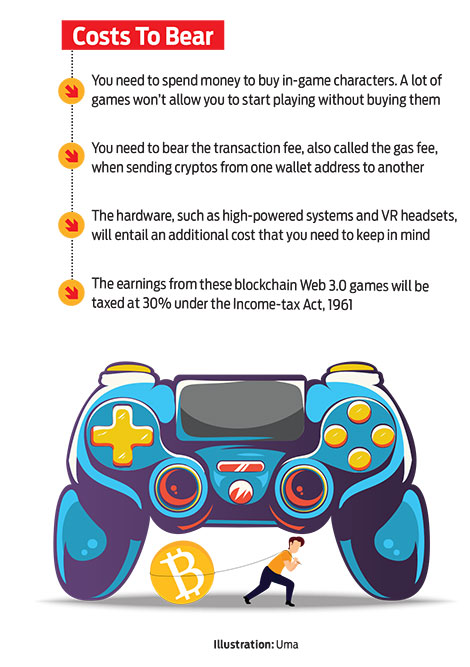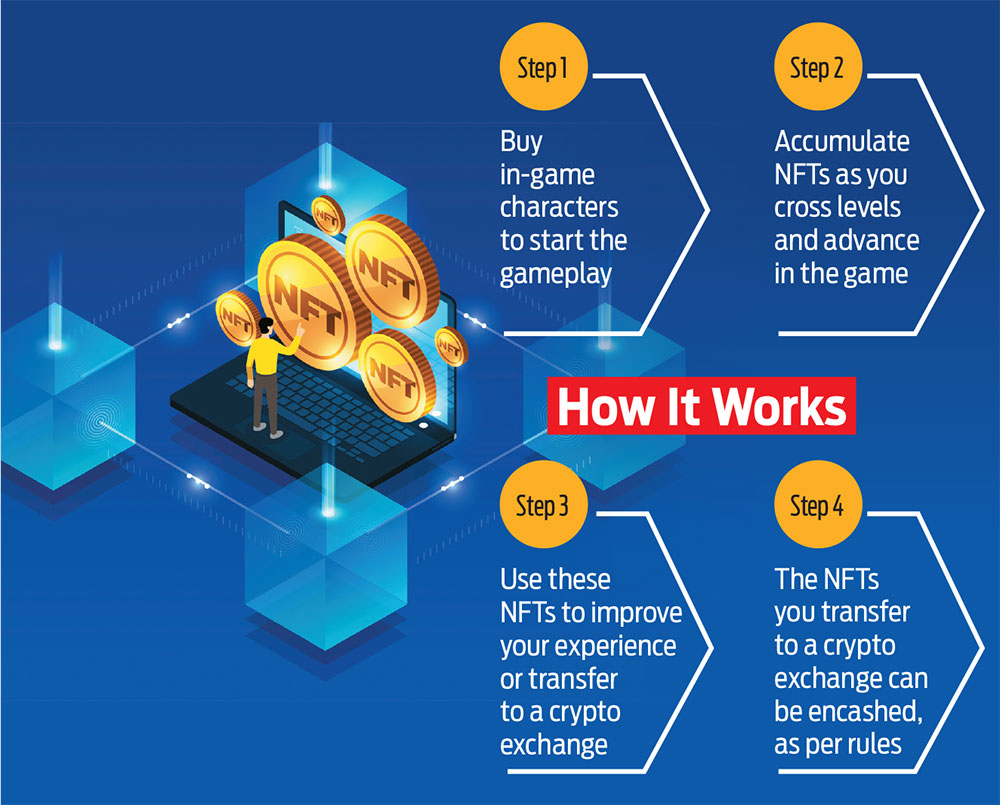If you’ve the played a football game on consoles such as the PS4 or X-Box, you would know how real that feels. The playing arena looks real, and there is the constant thrum of fans from the stands as they cheer your team. The jostling during gameplay, the injuries, the penalties, the replacements, everything is as it is on a real stadium. Now imagine yourself—your image to be precise—in the middle of all the action, navigating the web of opposing team members, hustling ahead, aiming for that goal, and then celebrating with your favourite football players with your signature style.
A football game in Metaverse promises that experience and more. Alas, it’s not a possibility at present. Until then, there are other things to give you that kick within the crypto contours—one of them being crypto- and non-fungible token (NFT)-based games that help you earn.
Would these games give you a kick? Most likely, they would, if you like to play video games and don’t find some earning on the side. Would these games give you an income? There is a big question mark on that aspect, since the cryptocurrency and blockchain universe remains unregulated and unexplored to a large extent and remain highly vulnerable to volatility and rampant fraud.
Among the few sectors that got a boost during the Covid-19 pandemic was the cryptocurrency industry. Crypto blockchain gaming companies also benefitted, as people lapped up newer forms of entertainment online when they were forced to stay indoors, acording to a recent report published by Statista, a data provider platform.
Play To Earn
It is the play-to-earn (P2E) concept that is attracting users. Crypto blockchain games are hosted on a blockchain and allow players to use in-game items earned during gameplay.
They are somewhat similar to video games in terms of look and feel, though not all of them are of the same level in terms of features. Just like you make in-game purchases using coins or points accumulated in video games to enhance your gaming experience, crypto games use the NFT technology and allow you to accumulate NFTs and/or cryptocurrency depending on the game. The difference though is that video games are built on Web 2.0 technology that allow coins to be used within the game, while the Web 3.0 technology behind crypto games allow you to exchange the coins with other platforms, including exchanges.
The rewards and in-game items that players earn in crypto games are NFTs, which can be traded or exchanged in the NFT marketplace or cryptocurrency exchanges that allow it. In fact, the central idea of these games is that they allow the gamers to sell, trade and exchange their in-game items as these are based on NFT technology. Tapan Sangal, founder of P2E Pro Pvt. Ltd, a Delhi-based blockchain gaming company, says that buyers essentially buy these NFTs to enhance their gaming experience.
“The concept of Web 3.0 Blockchain games are nothing but applied game theory tokenomic models for the purpose of bridging the gap between in-game experiences and economic incentives. An example is poker. You don’t have to trust the house or the dealer. There’s a smart contract which will play as the dealer. In Web 2.0, you have to trust the company, but the company can also take away your money and leave,” adds Sangal.

For example, Axie Infinity is a crypto blockchain game which is hosted on the Binance Smart Chain. Gamers can buy characters called Axies, and can sell them when they level up. Apart from this, there is a P2E component, wherein gamers earn XP when they battle with Axies. This XP can be exchanged for Smooth Love Potion (SLP), which is an Ethereum ERC-20-based crypto token that can be sold on crypto exchanges.
Sorare, an Ethereum blockchain-based NFT fantasy football manager game, enables you to buy, acquire and sell football player cards. Just like real football, you can own, build and manage your dream football team. The football player cards can also be traded or sold in the NFT marketplace. These are on the Ethereum blockchain and, thus, their ownership is foolproof. Some of the famous footballers whose player cards are available at Sorare are Barcelona FC defender Gerard Piqué and Real Madrid striker Karim Benzema.
These tokens can be encashed after being transferred to a crypto exchange.
The Rules Of The Game
Crypto blockchain games operate on the same principle of decentralisation that cryptocurrencies work on. Blockchain smart contracts are put in place to execute gameplay mechanics; hence, there is no scope of manipulation by anyone.
“Web 3.0 is all about decentralisation. So, while talking about P2E and other blockchain games, it is important that the content is not owned by a single entity and is also secure,” says Piyush Gupta, president, Kestone, a data-driven sales and marketing solutions company.
The central idea of these blockchain games being decentralisation, the concept of governance comes into play here. Governance tokens give the owners the right to vote and make decisions.
For example, the Axie Infinity game has two crypto tokens—SLP and Axie Infinity Shards (AXS). Since AXS is a governance token, its owners have a say on how the game works. This means that voting needs to be conducted among AXS owners for changing the gameplay mechanics or other aspects of the game.
Says Chetan Bhardwaj, co-founder and CEO, Driffle, a global marketplace for gamers: “These are the type of games where the ownership of assets and tokens are decentralised. Users are rewarded for playing games and for the assets they own. The economy of the game is decentralised and no single publisher controls it. The basic idea for creating these games was to give more asset and economical ownership to the player.”
There’s also more transparency on how these games work. Most of them are hosted on a public blockchain and anyone can view the smart contracts on which they run. Any number of defined parameters can be put in as a condition to the contract, and on fulfilment, the contract is executed. “The game’s logic is public. Your account address is with the blockchain. The smart contract runs the game and transfers the money to the respective winners’ addresses,” adds Sangal.

Giving The Game Away
The freedom to use in-game coins can be tantalising, but if you think it can be a source of income, you are living in fantasy. Here are some things you need to keep in mind.
Cost Heads: Though some blockchain games are free, you would need to buy crypto tokens to get in-game characters, without which you cannot start playing. “Axie Infinity, Enjin and other companies have launched some games where you need to buy tokens to get the playable character,” says Sangal.
Players can also freely roam the Decentraland Metaverse, but if they want to play poker there, they will have to buy the respective NFTs at the current price. Once the NFT is bought, the players will be rewarded in MANA (Decentraland’s crypto token) on completing certain specified tasks.
There is also a transaction fee that is levied when users send a crypto from one wallet address to another. This is called ‘gas fee’. For instance, the Axie Infinity website displays the live gas fee for all deposits and withdrawals.
You will also need to spend on the hardware if you expect a certain quality. Most games with low-resolution graphics and animation can be run on the cloud, and users can play them if you have a good Internet connection, but high-quality AAA-type games need good system and graphics units. If the game is around virtual reality, then you will need VR headsets and hardware too, says Sangal.
Earnings from these games will also attract tax at 30 per cent, as the Income-tax Act, 1961 considers these on a par with crypto transactions.
Technical Knowhow: You need to be well-versed with crypto wallets. You need specialised crypto wallets like Ronin wallet for Axie Infinity and Metamask wallet for other games. If you do not understand the nature of your crypto wallet, and are unable to enter the wallet details correctly at the time of the wallet transfer, the funds would be lost forever, since the transactions are anonymous.
“Digital wallets store your public and private keys. People can send cryptos to your digital wallet and you can send them cryptos. However, since cryptos work using blockchain technology, every transaction will be recorded on a public ledger. Also, transactions remain anonymous with only a wallet address that needs to be shared,” says John Balrup, chief product officer, Paxful, a cryptocurrency services company.
Keeping Yourself Secure: It is imperative that you read the respective blockchain game’s whitepaper and other official documents and learn about how exactly its NFT, and crypto token can be sold, earned, and how robust are its security protocols.
neelanjit@outlookindia.com

